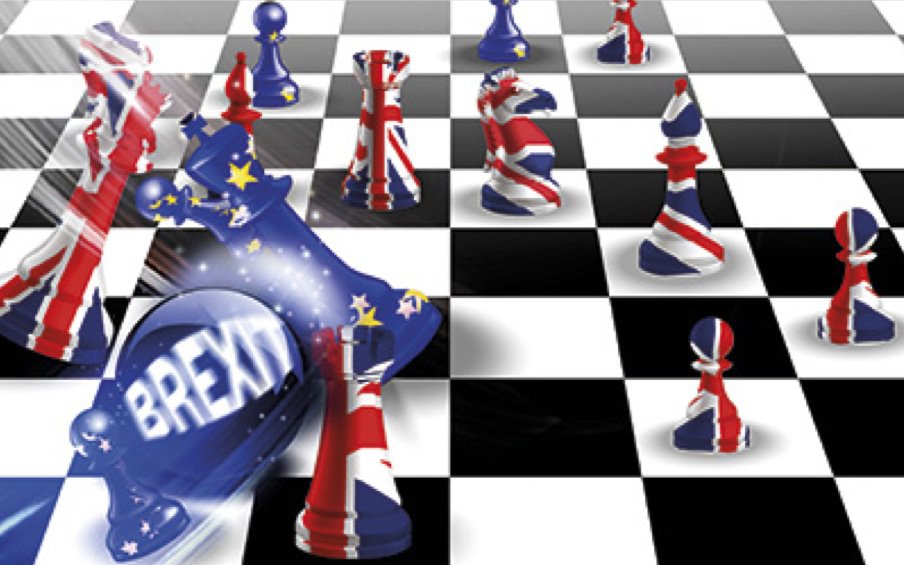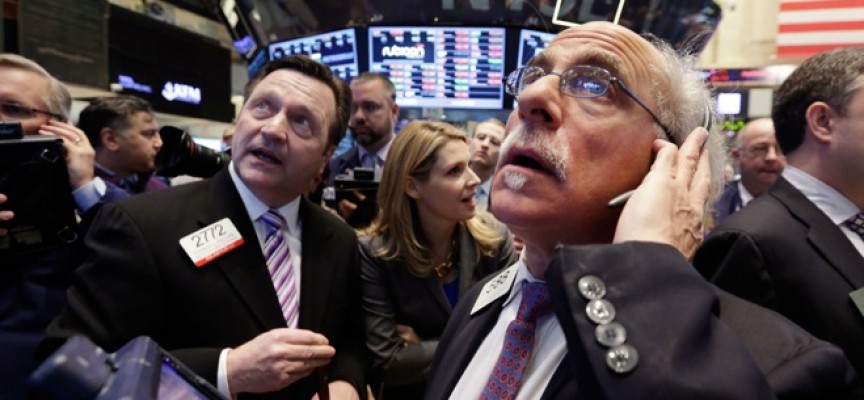Timing & trends

Last night Britons voted to leave the European Union, sending shock waves around the world — though not directly or immediately threatening the concept of European integration.
But what comes next emphatically does. Emboldened by the Brits, nationalist parties across the Continent are gearing up for exit votes of their own. Some notables:
Italy’s Northern League To Launch EU Referendum Campaign Next
(Zero Hedge) – Shortly after the final Brexit result was released, the head of Italy’s Northern League Said “Now it’s our turn’ After U.K.
As Dow Jones reports, Italy’s anti-immigrant and euroskeptic Northern League will start a petition calling for a law that allows a referendum on whether the country wants to exit the European Union, its leader said on Friday. In a news conference following the announcement of the U.K.’s decision to leave the EU, Northern League’s head Matteo Salvini said that it was time to give Italians a vote on their EU membership, as the citizens of Britain have just done.
“This vote was a slap in the face for all those who say that Europe is their own business and Italians don’t have to meddle with that,” Mr. Salvini said.
The Northern League launched a campaign against the euro in 2014, but it has been since overshadowed by the anti-immigrant campaigns on which it has built up its electoral support.
Northern Leage is not alone: recall that earlier this week, the anti-establishment 5 Star Movement, emboldened by dramatic victories in Italy’s recent mayoral elections in which Virginia Raggi, a 37-year old lawyer, was elected Rome’s first female mayor by winning a stunning 67% of the vote in the second round, also revived plans for a referendum on leaving the euro.
—————————
Dutch Party for Freedom leader Geert Wilders demands EU referendum
(BN News) – Dutch Party for Freedom leader Geert Wilders, reflecting on the United Kingdom’s decision to leave the European Union, is demanding a referendum to be held in the Netherlands to decide on the country’s EU membership. (more)
“The United Kingdom is leading the way to the future and liberation. The time is now for a new start, trusting in its own strength and sovereignty. Also in the Netherlands,” the party said in an emailed statement, shortly after referendum results in the UK showed a win for Leave.
“The Dutch population deserves a referendum as well,” the party said. “The Party for Freedom (PVV) demands therefore a referendum on NExit, a Dutch EU exit. Dutch people should have the opportunity as soon as possible to decide on the Dutch membership of the European Union.”
The Netherlands is scheduled to hold general elections next year, and Wilders – whose party has risen in the polls amidst the ongoing refugee crisis – pledged to hold a EU referendum if he were to be elected prime minister.
“We want to be the boss again over our own country, over our own money, our own borders and our own immigration policy,” Wilders said, less than an hour after results showed that British voters had opted to leave the 28-member bloc.
—————————
Marine and Marion Le Pen call for referendum in France on European Union membership
(News.com.au) – LEADERS of France’s far-right Front Nationale have praised the UK decision to leave the EU and called for a similar vote in France.
Presidential hopeful Marine Le Pen wrote on Twitter: “Victory for freedom! As I have been asking for years, now we need to have the same referendum in France and in the countries of the EU.”
She also changed her profile picture to a Union Jack and called a referendum in France a “democratic necessity”.
“The British people have given to Europeans and to all the people of the world a shining lesson in democracy,” she said.
Her niece Marion Le Pen has also called for a Frexit, saying “the French should have the right to choose.”
Even if Brexit had failed last night, the fact that it got close would have energized nationalist parties on the Continent, guaranteeing political drama for years to come. But with “leave” winning fairly decisively, that process has been turbo-charged. The result? Uncertainty as far as the eye can see. The entire European project is now in doubt, which will send trillions of euros pouring out in search of the certainty that can no longer be found at home.
Now watch the central banks. The crazier the world becomes they more the BoJ, Fed, and ECB will feel compelled to flood the markets with liquidity. Problem is, capital will soon be flowing out of financial assets even faster than central banks can pump it in.

 As global financial markets convulse in response to British citizens voting to leave the European Union, the stunning outcome of the U.K.’s referendum provides more questions than answers. As discussed on Monday, the heightened uncertainty, fueled by sudden institutional instability now compounding long-standing economic fragility and financial fluidity, is likely to cause an unprecedented mix of political turmoil, financial volatility and economic damage in the weeks ahead. It also leaves us with seven lessons whose implications extend well beyond Britain.
As global financial markets convulse in response to British citizens voting to leave the European Union, the stunning outcome of the U.K.’s referendum provides more questions than answers. As discussed on Monday, the heightened uncertainty, fueled by sudden institutional instability now compounding long-standing economic fragility and financial fluidity, is likely to cause an unprecedented mix of political turmoil, financial volatility and economic damage in the weeks ahead. It also leaves us with seven lessons whose implications extend well beyond Britain.
related:
“It’s Scary, And I’ve Never Seen Anything Like It” – Where Markets Are The Morning After


Voting has literally stunned the world and rocked global markets in the aftermath of the Brexit vote to “Leave” the EU.
Sterling hits 31-year low on Brexit, central banks hint at intervention
Sterling sank 10 percent in value to its weakest since before the 1985 Plaza Accord on Friday after Britain voted to leave the European Union, triggering a global rush of capital into the traditional security of the yen and the Swiss franc.
Alongside the biggest moves in the pound in living memory the euro, which is expected to struggle given worries about the impact of a “Brexit” on the euro zone economy, also dropped sharply against the dollar.
The franc surged to its strongest in almost a year against the euro, and the yen to its highest in more than two years. The Swiss National Bank became the first major central bank to step in to drive down the value of the franc, while speculation that the Bank of Japan could also act limited the yen’s advance.
Japanese Finance Minister Taro Aso said Prime Minister Shinzo Abe had instructed him to cooperate with the Bank of Japan and closely consult with Group of Seven partners in responding to market moves. Aso added that excess volatility in currency markets was undesirable and he would respond to market moves when necessary.
A German finance ministry spokesman said finance ministers and central bank chiefs from the G7 economic powers held a teleconference on Friday as Britain’s decision to leave the EU created ripples in the currency market and beyond.
The pound fell more than 10 percent to $1.3228 GBP=D4, its lowest since before the world’s major economies signed a deal to weaken the dollar in September 1985.
related:
El-Erian – Seven Lessons From the U.K.’s Departure


For those of you who are just waking up, first of all, congratulations. Here is what you missed.
European, Asian stocks and S&P futures plummet, as U.K. votes to leave European Union membership. FX carry trades everywhere go haywire, with the Dollar and Yen spiking while the Cable overnight plunged to 30 year lows and at last check was trading just around 1.37, down 1,300 pips from yesterday’s highs. A modest rebound was experienced when first the Bank of England and shortly after all other central banks promised to pump virtually unlimited liquidity into the financial system. Ironically, all of this takes place a day after Fed’s stress tests showing all 33 banks exceed minimum requirements – we may find out just how “unstressed” they are as soon as today.
For those who are pressed for time, the following quote from James Butterfill, head of research and investments at ETF Securities, summarized it best: “It’s scary, and I’ve never seen anything like it. We’re going to see outflows from basically any kind of cyclical asset. A lot of people were caught out, and many investors will lose a lot of money.”
Here are key market updates:
related:
El-Erian – Seven Lessons From the U.K.’s Departure

 Trace Mayer has been in on the Bitcoin band wagon since its inception. He’s seen it go to $1200 and then back down to $187 and now it’s headed back up. A few days ago it was trading at nearly $800 and now it’s just below $700. What should you make of all this volatility? Is it just another example of China’s emergence and growing instability. Yes, but it’s also Bitcoin’s growing acceptance as a medium of exchange. And that perhaps is the most exciting aspect of the this emerging story. Perhaps we’re witnessing the birth of the world’s next reserve currency!
Trace Mayer has been in on the Bitcoin band wagon since its inception. He’s seen it go to $1200 and then back down to $187 and now it’s headed back up. A few days ago it was trading at nearly $800 and now it’s just below $700. What should you make of all this volatility? Is it just another example of China’s emergence and growing instability. Yes, but it’s also Bitcoin’s growing acceptance as a medium of exchange. And that perhaps is the most exciting aspect of the this emerging story. Perhaps we’re witnessing the birth of the world’s next reserve currency!
related:












